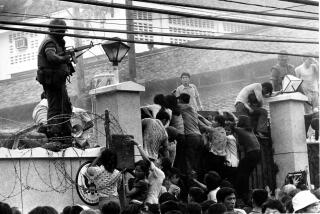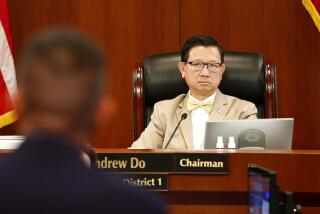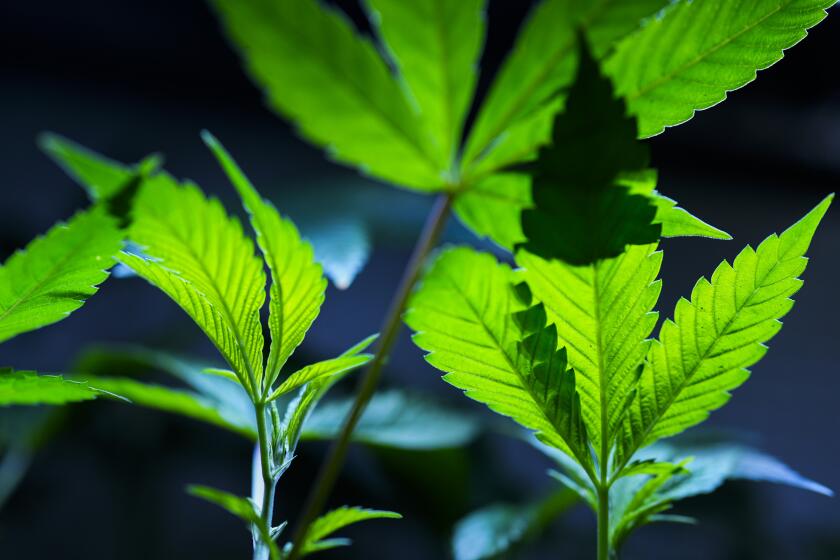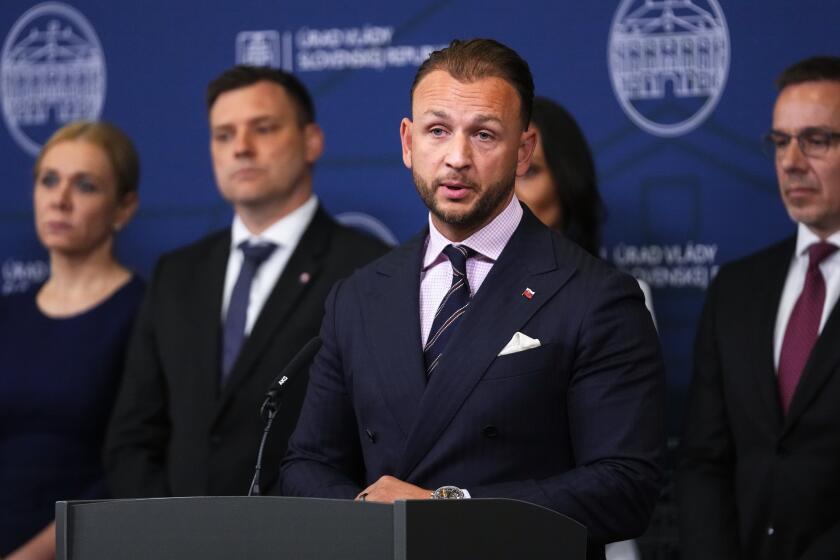Vietnam Calls O.C. Group Terrorists
As the United States presses its war against terrorism, Vietnam is demanding that American officials extend the crackdown to an immigrant group they say has sponsored Southeast Asian bombing attempts from its headquarters in a nondescript Garden Grove office building.
The group, which calls itself the Government of Free Vietnam, consists largely of former South Vietnamese soldiers and bureaucrats who, more than a quarter-century after the fall of Saigon, refuse to accept the Communist regime as the ruler of their native land.
Members of the group say they have spent six years organizing jungle training camps in Thailand and Laos and that some of them have mounted unsuccessful bomb attempts against Vietnamese government facilities.
Hanoi last week called on the United States to “collaborate with Vietnam in stopping and punishing the masterminds and those who plan terrorist acts against the Vietnamese government and its people.”
The demand came after FBI agents arrested a member of the group, Van Duc Vo, 41, at John Wayne Airport in Orange County on Oct. 12 after Thai police named him the main suspect in an attempted bombing of the Vietnamese embassy in Bangkok this summer.
Vo, a naturalized American citizen formerly of El Monte, remains jailed on charges of use of a weapon of mass destruction by a U.S. national in a foreign country, a federal crime that could carry a life term.
The State Department had no official response to Vietnam’s demand, but a spokesman said the U.S. government “has concerns about the possibility of people violating our laws, and we’ve warned them not to do it.”
He referred questions about Free Vietnam to the Department of Justice and the FBI, where officials declined to comment.
Vietnam has asked the United States to bring terrorism charges against the group’s leader, former civil engineer Chanh Huu Nguyen, 52.
“Many times [group members] have organized bombings in Vietnam and against its agencies abroad,” said Thuy Thanh Phan, spokeswoman for the Vietnamese Department of Foreign Affairs. “Vietnam has asked the U.S. to stop harboring, tolerating or supporting that group. It should punish those who commit terrorist acts on Vietnam . . . like Nguyen and his group.”
Until Vo’s arrest, Free Vietnam was little known outside the Vietnamese community. So far, its most clear-cut success seems to have been in annoying the Vietnamese government.
The group considers itself to be Vietnam’s legitimate government in exile, complete with a “cabinet” that meets frequently. But some dismiss it as irrelevant, and suggest that it is just a vehicle for Nguyen’s personal ambitions. At least one supporter said he loaned the organization $50,000 and never has been repaid.
Nguyen walks a fine line. Overall, he is defiant, saying Free Vietnam members acting on their own have been involved in bomb attacks against Vietnamese interests. He vowed that his group would continue to select targets within Vietnam.
“We can destroy factories; we can destroy ammunition,” he said.
Yet he also describes himself as a “peaceful political fighter for my country’s democracy and freedom. . . . Vietnam is taking advantage of the terrorist situation by claiming that I’m a terrorist.”
The Vietnamese government has tried to play off the Sept. 11 attacks to kindle a sense of outrage that the United States could be harboring terrorists on its own soil while it bombs Afghanistan in its quest to destroy Osama bin Laden’s Al Qaeda terrorist network.
“It would be absolutely hypocritical for us to expect world cooperation against a group that attacked us if we were not willing to cooperate in going after groups attacking other countries,” said Stephen M. Walt, a professor of international politics at Harvard University’s Kennedy Center on Government.
Though it is not illegal for U.S. citizens to call for the overthrow of a foreign government, it is against the law for Americans to become involved in the effort to do so.
Reports of Americans taking part in anti-government attacks in Cambodia last November, and other unspecified actions elsewhere in the region, led to a special State Department warning Dec. 19 that Americans could be prosecuted for acts against foreign governments.
It is illegal to raise money in the United States for overseas terror campaigns, although the practice--by organizations ranging from the Irish Republican Army to the militant Islamic group Hamas--has been noted for years. Law enforcement efforts to stop it occur sporadically but are difficult to pull off, experts say.
Earlier this year, a New York group linked to anti-Arab Israeli groups was raided by federal officials who confiscated computers and records. And in 1998, federal officials in Chicago seized about $1.1 million from Mohammed Salah and the Quranic Literacy Institute after accusing them of fronting for Hamas.
William Banks, a law professor at Syracuse University and expert on national security law, said terrorism cases can be difficult to mount, requiring complex investigations domestically and overseas, where U.S. laws don’t apply. Yet the evidence still has to be gathered in such a way that it’s admissible in U.S. courts.
“You do need to track evidence and build a case as if it occurred in New York or Los Angeles,” he said.
Nguyen said it would be unfair for the United States to arrest him at the request of Vietnam.
“I haven’t done anything wrong in America,” he said.
Nguyen, sitting at the head of a large table in a brightly lit Free Vietnam conference room, said his group is not terrorist because it operates openly and avoids injuring people.
“Terrorists don’t have addresses; they work underground and they kill people,” Nguyen said in his loud and raspy voice as a dozen members of Free Vietnam’s “cabinet” listened from the other end of the table.
The Government of Free Vietnam came together in 1995 out of the remnants of earlier opposition groups, launched largely through the force of Nguyen’s personality. Their base now is Little Saigon in the heart of Orange County, home to the nation’s largest Vietnamese community.
Nguyen clearly enjoys the spotlight. A picture of him shaking hands with former President Bill Clinton hangs on a wall of the Free Vietnam office, and he keeps a binder with copies of news stories in which he was featured.
Verifiable details on the group are hard to come by. Nguyen said it has a budget of about $1 million a year, mostly from wealthy Vietnamese businessmen around the world and the group’s cabinet, some of whom sold their homes and businesses to raise money.
Nguyen claims about 200,000 members worldwide, about half in Cambodia and Vietnam, and about 10,000 members in the United States. But in the past, the organization has reported only a few thousand members worldwide.
The group positions itself as the keeper of the chain of governance established in the 1940s, when France granted the former colony its independence and set in motion the events that led to nearly three decades of war.
Nguyen said the group opened training camps in the jungle near the Thai-Cambodian border in 1995, geared toward indoctrinating Vietnamese citizens in democracy and free-market economics.
In 1998, Cambodian forces attacked a Free Vietnam convention at the remote camp, which was then shut down by Thai military forces, according to Nguyen and press accounts. Three people were reported wounded and Nguyen was arrested and deported.
The group simply moved its operations to a remote region of Laos near the Vietnamese border, where it operates unfettered, he said.
Nguyen said members were involved in the summer incident in Bangkok, in which two bombs were placed at the Vietnamese embassy but did not detonate. A second embassy bombing plot involving a Free Vietnam member was uncovered in Manila. Nguyen said he didn’t authorize those actions but described them as bomb scares, not real attempts to blow up buildings.
Vo, arrested Oct. 12 at John Wayne Airport in connection with the Bangkok incident, was described by the FBI in court papers as a member of an unspecified Orange County-based anti-Communist group that “wanted to overthrow the Vietnamese regime.” Thai police said Vo was a member of Free Vietnam’s military wing.
Nguyen said he spoke by telephone with Vo soon after the bombs were discovered.
“I asked Mr. Vo, who reported to me, and he said ‘No, it’s a bomb scare, boss; it’s not real,’ ” Nguyen said.
Nguyen also said he personally directed the timing of failed attempts to blow up Communist statues in Can Tho, a southern Vietnamese city, in 1999. In an ensuing roundup, the Vietnamese government in May sentenced 37 Free Vietnam members and supporters to as many as 20 years in prison.
Despite being wanted by Vietnamese officials, Nguyen said he has made repeated trips into the Communist-controlled country by slipping across the Laotian border.
Until Vo’s arrest, the group’s one run-in with authorities in the United States occurred in 1998, when the California Department of Corporations ordered Free Vietnam to stop selling bonds to raise money because it lacked the proper permits.
Nguyen denied any wrongdoing. He also rejects claims by some former group members that he never repaid money they had lent the effort. Van Tran, 59, of Arleta said he lent $50,000 to the group while he served as “secretary of commerce” after being promised he would be reimbursed. He said he wasn’t.
“I was so willing to sacrifice anything for the freedom of my homeland that I didn’t know I was getting ripped off,” Tran said. “I just wanted to get rid of the Communists.”
Former South Vietnamese soldier Huy Thanh Nguyen, 60, sold his sewing business in New Jersey five years ago to move to Westminster and join the organization because “I really thought the group had a true mission to wipe out communism in my homeland.”
He said Nguyen, who is not related, told him of armed, trained soldiers waiting in Thailand to overthrow the Vietnamese Communists. When he visited the camp, though, he saw only about 20 people, including some former soldiers.
“I didn’t see anything that he had been telling us about,” Huy Thanh Nguyen said.
More to Read
Start your day right
Sign up for Essential California for news, features and recommendations from the L.A. Times and beyond in your inbox six days a week.
You may occasionally receive promotional content from the Los Angeles Times.







